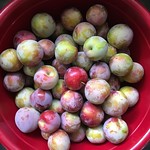Watercress
Watercress, scientifically known as Nasturtium officinale, is an aquatic perennial herb that belongs to the Brassicaceae family. It is native to Europe and Central Asia but has been introduced to other parts of the world, including North America, where it is now widely cultivated. Watercress typically grows in shallow streams and ditches, where its stems and leaves float on the water's surface, or in moist soil near waterways.
Watercress has a long history of use for both culinary and medicinal purposes. It has been cultivated for over 2,000 years and was used by the ancient Greeks and Romans for its medicinal properties. In traditional medicine, watercress has been used to treat a range of ailments, including coughs, colds, and digestive issues. It was also believed to have blood-cleansing properties and was used as a diuretic.
Watercress is a nutrient-dense food that is rich in vitamins and minerals. It is an excellent source of vitamin K, vitamin C, vitamin A, calcium, and iron. It also contains antioxidants, including beta-carotene and lutein, which can help protect the body against cellular damage caused by free radicals. Watercress is also low in calories and high in fiber, making it an excellent choice for those looking to maintain a healthy weight or improve their digestion.
In summary, watercress is a nutrient-dense aquatic herb that has been cultivated for thousands of years for its culinary and medicinal properties. It is a rich source of vitamins, minerals, and antioxidants and is low in calories and high in fiber. Its long history of use and nutritional value make it a valuable addition to any healthy diet.
Ancient Greek herbalists and doctors believe that eating salad greens such as lettuce, chicory and arugula were good for the stomach. Dioscorides, a Greek writer in the 1st century AD, praised arugula as "provoking venery”. Lettuce’s name Lactuca stems from the belief that nursing mothers would benefit from its milky juices. Lettuces were also believe to promote sleep, “soporific”, which fans of Beatrix Potter’s tales would believe.
Highlights
- Watercress is an excellent source of Vitamin K
- Watercress is also a good source of Quercetin
- The typical serving size for Watercress is very small, so while it may be rich in some nutrients, we can't consider it a good or exceptional source.
 eat a plum
eat a plum